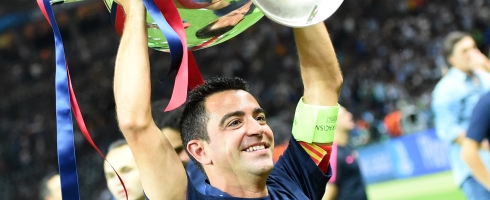Seven-hundred-and-sixty-seven appearances, 84 goals and several barrel loads’ worth of assists later, Xavi Hernandez is a Barcelona player no more – assuming he does not return on a mid-season loan.
The midfielder still had a year left on his Barca contract, but such has been his contribution to the Camp Nou cause that the club allowed him to prematurely secure one final pay day on sunny Qatari shores with Al Sadd, where he will play for the next three years, take up an ambassadorial role for the 2022 World Cup and help to coordinate the country’s Aspire Academy.
The 2014-15 campaign was always going to be a tough one for Xavi in light of Spain’s dismal World Cup defence, the €20m arrival of Ivan Rakitic from Sevilla and his advancing years. Now 35 and arguably past the peak of his powers, the playmaker could no longer be relied upon by incoming Coach Luis Enrique, but his influence has never been confined to just the football pitch.
Yet every one of his rivals would have looked on with a great tinge of envy as he still made 43 appearances for the 21st century’s greatest superpower and ensured he left for Qatar as the most decorated player in Spanish football history with 25 club trophies to his name, having just contributed to a historic second treble of La Liga, the Copa del Rey and the Champions League.
However, it would be wrong to analyse Xavi’s impact on Barca without acknowledging Xavi the man, for this is someone with Barca flowing through his veins and why they are ‘more than a club’. A local lad, the playmaker is now considered a contemporary icon of Catalanism and was revered every time he stepped out onto Camp Nou, his spiritual home, regardless of the outcome.
Nonetheless, his influence on modern football will never be forgotten. Supremely adaptable, given the number of club and country squads he has embodied, and the archetypal team player who every burgeoning youngster now aspires to, as the beautiful game becomes more decentralised, both pale in significance to something far less complex – his rigorous pursuit of perfection.
Xavi’s case is a curious one when you consider that he did not truly hit his prime until the wrong end of 20. Having been imprinted with the Barca DNA throughout his youth education at the club, the Terrassa native’s early impact on the first team was chequered by instability as he played under a different Coach in five of his opening six seasons until Frank Rijkaard’s appointment in 2003.
The Dutchman’s arrival signalled a change in not just Barca’s fortunes but Xavi’s too. With new President Joan Laporta laying the foundations for an unprecedented period of success, the midfielder began to show he could one day succeed his future mentor Pep Guardiola in the middle of the park, although Deco and injuries initially prevented him from surpassing his predecessor.
There was even talk that Xavi would leave Barca following Spain’s triumphant Euro 2008 campaign, in which he played a defining role, with Bayern Munich reportedly sniffing around, but he eventually stayed loyal to his boyhood team. Rijkaard was then replaced by Guardiola at around the same time the rumours had begun to die down, and the rest, as they say, is history.
His career successes speak for themselves – among them, eight La Ligas, three Copas, six Supercopas, four Champions Leagues, two UEFA Super Cups, two Club World Cups, two European Championships, one World Cup, six FIFPro World XI nominations, five UEFA Team of the Year inclusions, four-time IFFHS Best Playmaker and two third-place finishes in the Ballon d’Or running.
In an era of increasing complexities, it’s quite fitting to consider that the best player not named Lionel Messi of the past seven years has also been the most simple, perfecting the ability to pass and move more so than anyone else before him. The quintessence of Barca’s acclaimed ‘tiki-taka’ philosophy in all its glory between 2008 and 2012 and post-Pep, no-one does it better.

